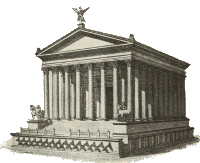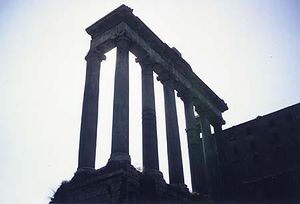HU:Cultus deorum Romanorum
| Line 1: | Line 1: | ||
{{languageBar|Cultus deorum Romanorum}}__NOTOC__ __NOEDITSECTION__ | {{languageBar|Cultus deorum Romanorum}}__NOTOC__ __NOEDITSECTION__ | ||
| − | [[Image:Platner-temple-line-trans-50.gif|right]]<onlyinclude>A ''Cultus Deorum Romanorum'' gyakorlata modern kísérletünk az ókori római vallás [[HU:reconstructionism|rekonstrukciójára]] a lehető legpontosabb megközelítésben. | + | [[Image:Platner-temple-line-trans-50.gif|right]]<onlyinclude>A ''Cultus Deorum Romanorum'' gyakorlata modern kísérletünk az ókori római vallás [[HU:reconstructionism|rekonstrukciójára]] a lehető legpontosabb megközelítésben.</onlyinclude> A ''Cultus Deorum Romanorum'' nem közelíthető meg csupán azzal, hogy a római istenneveket beillesztjük a görög vagy bármely más vallási rendszerbe, mert a római vallás ugyanolyan egyedi terméke annak a kultúrának, amely létrehozta, mint bármely más vallás. Állhatatosságot, elkötelezettséget, a halhatatlan istenekkel és az univerzum rendjével összhangban folyó munkát kíván meg tőlünk, és nem csak önmagunk miatt, hanem a világért is, amelyben élünk. Az isteneknek tetsző cselekedetekkel és hozzáállással mind az állam, mind az egyén áldásban részesülhet. Már maga a ''cultus deorum'' kifejezés is többet jelent, mint istenes cselekedeteket és evilági hatalmat; léteznek a római valláson belül misztikus hagyományok is, melyek belső, spirituális gyarapodásunkat célozzák még. |
| − | + | ==Hivatalos levelezőlista== | |
| − | + | A ''cultus deorum'' témakörébe tartozó kérdések megvitatására létrehozott hivatalos levelezőlistánk: http://groups.yahoo.com/group/ReligioRomana/ | |
| − | + | ||
| − | + | ||
| − | + | ||
{|cellpadding="0" border="0" width="100%" align="center" | {|cellpadding="0" border="0" width="100%" align="center" | ||
| Line 20: | Line 17: | ||
Influenced by their Etruscan (and later, Greek) neighbors, the Romans developed a complex state religion that emphasised [[pietas|duty to the gods]] and serving them through exactly prescribed [[:Category:Ritus|rituals]]. }} | Influenced by their Etruscan (and later, Greek) neighbors, the Romans developed a complex state religion that emphasised [[pietas|duty to the gods]] and serving them through exactly prescribed [[:Category:Ritus|rituals]]. }} | ||
| − | {{PortalBox | title= | + | {{PortalBox | title=Válogatott linkek (Roma Antiqua) | content= |
* [[Numa tradition]] | * [[Numa tradition]] | ||
* [[Lararium]] | * [[Lararium]] | ||
| Line 27: | Line 24: | ||
*'''See [[:Category:Religio Romana|all articles about the cultus deorum in Roma Antiqua]].}} | *'''See [[:Category:Religio Romana|all articles about the cultus deorum in Roma Antiqua]].}} | ||
| − | {{PortalBox | title= | + | {{PortalBox | title=Választott kép | content=[[Image:Temple of Saturn courtesy of Vroma.jpg|300px|center]]<br/>The Temple of Saturn in the [[Forum]].}} |
|valign="top"|{{PortalBox | title=''Cultus Deorum in Nova Roma'' | content= | |valign="top"|{{PortalBox | title=''Cultus Deorum in Nova Roma'' | content= | ||
| Line 38: | Line 35: | ||
Because of the principles of reconstructionism, almost everything that can be said about the historical cultus is also true about the modern cultus. The articles on the ''cultus deorum in Roma antiqua'' and our "[[Reading list for the cultus deorum]]" are a good places to start.}} | Because of the principles of reconstructionism, almost everything that can be said about the historical cultus is also true about the modern cultus. The articles on the ''cultus deorum in Roma antiqua'' and our "[[Reading list for the cultus deorum]]" are a good places to start.}} | ||
| − | {{PortalBox | title= | + | {{PortalBox | title=Válogatott linkek (Nova Roma) | content= |
* [[Declaration of Roman Paganism|Declaration of Roman Paganism]] | * [[Declaration of Roman Paganism|Declaration of Roman Paganism]] | ||
* [[:Category:Nova Roma Virtual Temples|Nova Roma Virtual Temples]] | * [[:Category:Nova Roma Virtual Temples|Nova Roma Virtual Temples]] | ||
| Line 46: | Line 43: | ||
*'''See [[:Category:Religio Romana (Nova Roma)|all articles about the cultus deorum in Nova Roma]]'''. | *'''See [[:Category:Religio Romana (Nova Roma)|all articles about the cultus deorum in Nova Roma]]'''. | ||
}} | }} | ||
| − | {{PortalBox | title=Nova Roma | + | {{PortalBox | title=Nova Roma Kalendáriuma| content=Our [[Fasti_MMDCCLXI|calendar]] lists all of our official festivals. A printed version is available in the [[Macellum]]. |
The [[Nundinae|nundinal letter]] this year is '''{{marketday}}'''.}} | The [[Nundinae|nundinal letter]] this year is '''{{marketday}}'''.}} | ||
| Line 56: | Line 53: | ||
The ultimate goal is the restoration of the [[Palatine]] temple of [[Magna Mater]]. There is a [[Magna Mater Project|full description of the project]]. | The ultimate goal is the restoration of the [[Palatine]] temple of [[Magna Mater]]. There is a [[Magna Mater Project|full description of the project]]. | ||
| − | ==Wiki | + | ==Wiki projektek== |
Citizens are invited to add photos to the [[Lararium|lararium page]].}} | Citizens are invited to add photos to the [[Lararium|lararium page]].}} | ||
Revision as of 16:48, 30 January 2008
Home | Latíné | Deutsch | Español | Français | Italiano | Magyar | Português | Română | Русский | English
⚜⚜⚜ Honlaptérkép ⚜⚜⚜
A Cultus Deorum Romanorum gyakorlata modern kísérletünk az ókori római vallás rekonstrukciójára a lehető legpontosabb megközelítésben. A Cultus Deorum Romanorum nem közelíthető meg csupán azzal, hogy a római istenneveket beillesztjük a görög vagy bármely más vallási rendszerbe, mert a római vallás ugyanolyan egyedi terméke annak a kultúrának, amely létrehozta, mint bármely más vallás. Állhatatosságot, elkötelezettséget, a halhatatlan istenekkel és az univerzum rendjével összhangban folyó munkát kíván meg tőlünk, és nem csak önmagunk miatt, hanem a világért is, amelyben élünk. Az isteneknek tetsző cselekedetekkel és hozzáállással mind az állam, mind az egyén áldásban részesülhet. Már maga a cultus deorum kifejezés is többet jelent, mint istenes cselekedeteket és evilági hatalmat; léteznek a római valláson belül misztikus hagyományok is, melyek belső, spirituális gyarapodásunkat célozzák még.Hivatalos levelezőlista
A cultus deorum témakörébe tartozó kérdések megvitatására létrehozott hivatalos levelezőlistánk: http://groups.yahoo.com/group/ReligioRomana/
|
Cultus Deorum in Roma Antiqua
The Cultus Deorum Romanorum is the pre-Christian religion of Rome. It began as the practices of the farmers of the village of Rome. "I am quite certain that Romulus by instituting auspices, and Numa ritual, laid the foundations of our state, which would never have been able to be so great had not the immortal gods been placated to the utmost extent." -- Cicero "On the Nature of the Gods"Influenced by their Etruscan (and later, Greek) neighbors, the Romans developed a complex state religion that emphasised duty to the gods and serving them through exactly prescribed rituals. Válogatott linkek (Roma Antiqua)
Választott kép
|
Cultus Deorum in Nova Roma
Sometimes called "Roman Paganism", the modern practice of the Cultus Deorum Romanorum is an attempt to reconstruct the ancient religion of the Romans as closely as possible, making as few concessions to modern sensibilities as possible. As with other forms of historical reconstructionist paganism, every attempt is made to rely on actual historical and archaeological evidence, and interpolations are made only when the primary sources are silent, and then we strive to be consistent with them. [1] When gaps in the evidence, or the realities of modern life, make it necessary to create something new it should be:
Starting with the Cultus Deorum todayBecause of the principles of reconstructionism, almost everything that can be said about the historical cultus is also true about the modern cultus. The articles on the cultus deorum in Roma antiqua and our "Reading list for the cultus deorum" are a good places to start.Válogatott linkek (Nova Roma)
Nova Roma Kalendáriuma
Our calendar lists all of our official festivals. A printed version is available in the Macellum. The nundinal letter this year is G. |
Cultus Deorum projects
Magna Mater ProjectThe ultimate goal is the restoration of the Palatine temple of Magna Mater. There is a full description of the project. Wiki projektekCitizens are invited to add photos to the lararium page. | |
Master Index
Master Index
Master Index > Maintenance Categories > Pages to be deleted > HU:Portals
Master Index > Maintenance Categories > Pages to be deleted > Magyar
Master Index > Maintenance Categories > Pages to be deleted > Magyar
Master Index > Maintenance Categories > Pages to be deleted > Nova Roma (Magyar)
Master Index > Maintenance Categories > Pages to be deleted > Nova Roma (Magyar)

